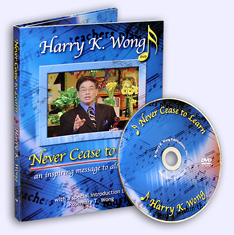

Plan and Then Plan Some More
Being prepared is essential—no matter the endeavor. Sports teams have preseason training camps, actors have production rehearsals, and schools have emergency drills. The effective teacher plans, and then plans some more.
The effective teacher shares the classroom plan with students, who then comprehend their role in the classroom management plan and can become responsible for carrying out the plan. Students will come to understand the important role they play in classroom management and the success of the class during the school year.
If you’ve ever painted a wall, you know that the preparation work takes longer than the actual painting. Poor preparation results in a poor paint job that has to be redone. Invest time to prepare, so that before the bell rings for a new school year, your students are following procedures as they begin their journey for a successful year ahead.
Create a classroom environment with a Culture of Consistency, so students know what will happen every day. Creating a Culture of Consistency streamlines the classroom and allows for maximum use of instructional time.
Have a Plan
 One of the most successful, collegiate football coaches was Paul “Bear” Bryant from the University of Alabama. Upon his retirement, he had won 323 football games, 13 conference titles, and 6 national championships. He was immortalized in a postage stamp that showed him wearing his signature hounds tooth hat and holding a rolled up piece of paper in his hand. That was his game plan—a plan he had in his hands every single game. One of the most successful, collegiate football coaches was Paul “Bear” Bryant from the University of Alabama. Upon his retirement, he had won 323 football games, 13 conference titles, and 6 national championships. He was immortalized in a postage stamp that showed him wearing his signature hounds tooth hat and holding a rolled up piece of paper in his hand. That was his game plan—a plan he had in his hands every single game.
Have a plan, not only for the day, but for the week and the month and the year, and ten years from now.
Anticipate. Plan. Anticipate every situation that could arise.
Plan for every situation that could arise. Don’t think second by second about what needs to be done. Have a plan. Follow the plan, and you’ll be surprised how successful you can be.
Most people don’t plan. That’s why it is easy to beat most folks.
Coach Paul “Bear” Bryant
University of Alabama
What to Have Ready for the Start of School
If you do not have a plan for your classroom, then the students will plan the classroom for you. That is a frightening scenario. Calvin Freeman thought all he had to do was cover the textbook. The textbook became his curriculum; he had no classroom management plan or lesson plans. As he covered the textbook, behavior problems would pop up; so every day, it was cover and discipline, cover and discipline. Without a plan, the students were now in control of the classroom and he went home at the end of each day sick to his stomach.
The effective teacher develops a classroom management plan and has it in place before school begins. The plan outlines classroom procedures (what students are to DO in the classroom) and ensures the classroom runs smoothly.
Your readiness before the first day of school is an excellent predictor of your success and effectiveness for the rest of the school year.
The saying, “First impressions are lasting impressions,” rings true. The first day of school is the most important day of the school year—not a day to play it by ear. Show students you are ready for learning to take place and that you expect them to be ready to learn the moment they enter the classroom.
A Complete First-Day Script Checklist
 Sally Lutz is a tenth-grade, Intensive Reading, high school teacher in Florida. She uses a checklist format for her first day of school management plan. As she completes each item, she checks it off the list. Sally Lutz is a tenth-grade, Intensive Reading, high school teacher in Florida. She uses a checklist format for her first day of school management plan. As she completes each item, she checks it off the list.
 |
Cheerfully and enthusiastically greet students at the door, making eye contact with each. If names are known, greet students accordingly. |
 |
Share personal information, expectations, and educational philosophy. |
 |
Post a seating chart on the whiteboard for each class period. Instruct students to reference the chart as they enter the classroom. |
 |
Place the journals at their desks (arranged in groups of four). Write prompts with explanations/directions on the whiteboard. This is where the weekly journal entry and the daily bellwork will be found throughout the school year. |
 |
Place the journals at their desks (arranged in groups of four). Write prompts with explanations/directions on the whiteboard. This is where the weekly journal entry and the daily bellwork will be found throughout the school year. |
 |
Take attendance quickly while students complete the opening assignment. |
 |
Share with students that they are expected to be in their seats when the bell rings; otherwise, they will be marked tardy. Late passes are placed in a basket near the door and filed in student portfolios. After the third tardy they will be issued a referral and sent to the Dean’s office, and detention will be served. Running through the door when the bell is ringing is not acceptable. The classroom is set up and conducted as a place of professional business. If the student is tardy or absent, a designated area and bin will house work that was missed. |
 |
The first week’s journal prompt will be copied as follows:
- Hi, Mrs. Lutz. My name is__________.
- My school schedule is__________.
- My interests and hobbies are__________.
- I did not do well on the FCAT because I__________.
- In this class I hope to learn__________.
- My address is__________.
- My home phone number is__________.
- I do/do not have my driver’s license. (circle one)
- My favorite class is__________.
Reasons__________.
- My least favorite class is__________.
Reasons__________.
|
 |
On the outside of the journal, students write their first and last names/class periods. Journals prompts are to be answered in complete sentences. Prompts are to be copied word for word from the board. Permanent markers will be provided with designations and instructions posted in the classroom explaining how to obtain and return them. |
 |
Journals are kept in a specific location. How they are to be picked up and returned will be modeled. (Throwing them into the bin is not acceptable.) |
 |
Show the bin for completed homework and in-class assignments. |
 |
Share the bulletin board with classroom procedures (not rules), district dress code, class supplies, and syllabus. There will be a visual of each supply item on the ledge. |
 |
Designate two bulletin boards for students. These will include photos, newspaper clippings of student accomplishments, or any newsworthy information about the students. |
 |
The organization of the classroom and how it is run is explained and modeled. For example, in a designated closet, a numbered shelf is provided per class period for student supplies, materials, and the like. |
 |
Distribute papers with syllabus, classroom procedures, and class supply list. Each informational paper will be on a different piece of brightly colored paper. |
 |
Designate an area on the whiteboard for the date, assignments, and how to head a paper. |
 |
Explain the word wall and its function. |
 |
Point out bins where Hi-liters, rulers, dry-erase markers and erasers, glue, scissors, hole-punches, and sharpeners are stored. Explain how to properly obtain and replace the supplies. |
 |
Identify one person from each group as the runner. This person will obtain necessary items needed for the day’s work. Items will be listed on the board daily. |
 |
If a pen or pencil is needed for the day’s work, students may borrow supplies from Mrs. Lutz only if the student provides collateral. |
 |
Share the I.O.N.U. System (I Observe No Unfriendliness). This system is based upon the book, Likeability Factor, by Tim Sanders. |
 |
Review dismissal procedures. The bell does not necessarily dismiss students; Mrs. Lutz does. Students will not gather at the door; they will remain in their seats prior to dismissal. |
 |
Prior to dismissal, make a quick sweep of the classroom for cleanliness. There should be no paper on the floor, all items should be properly returned to their rightful place, and desks should be in prearranged positions. |
 |
Prepare a substitute folder. Inform students of your expectations if and when a substitute is needed—actually speaking to the class, giving out instructions for that day. |
The above plan can be found on page 22 in THE Classroom Management Book.
A Plan in a Trifold
Oretha Ferguson teaches high school in Arkansas and is one of the co-authors of THE Classroom Management Book. She shares her classroom management plan with her students with a trifold, a paper folded into three parts. This trifold is available for any student who enters the class after the first day of school.


On graduation day this past May, three of Oretha’s students who she had as sophomores came back to her classroom to sit in the seats they had occupied two years ago. As sophomores, they had taken a snapshot of themselves in her classroom and wanted to re-create the photo again as graduating seniors.
Oretha shared, “The four of us sat and talked and reminisced about their time in my classroom. Priceless!”

As Oretha shares (see page ii, THE Classroom Management Book), “Procedures help me manage my class so that I can be an effective teacher.” With a classroom management plan ready on the first day of school, the year will not only flow smoothly, but years later, students will return to thank you for a well-organized class where they could learn. There is no price tag worthy enough to symbolically attach to the cost of student success. The benefits are priceless, and the price tag to accomplish it—zero! It doesn’t cost even a dime to create an effective classroom.
From Planning to Action
Oftentimes, we refer to a Classroom Management Plan as a Classroom Management Action Plan. We hear the woes of teachers who have a plan, but the plan sits on a shelf gathering dust. They complain of telling the students the plan, and they just don’t follow the plan.
A plan is only as good as the action that is put forth to implement the plan. The students must know your plan so they can become responsible for carrying it out—even if you are not in the classroom. Your plan becomes the routine of the classroom each day. The time flows smoothly because everyone knows what to do and the students become responsible for carrying out the actions of the plan.
Coaches are hired to produce winning teams. In training camp, the team goes through the steps to produce results so that on game day, the plan is executed and put into action.
Teachers are hired to produce student learning. During the first days of school, the students are taught the steps so that learning can take place. On each day of the school year, the plan is consistently executed and put into action. A class of winners is created because you planned for it and put it into practice.
Have a plan, not just for the first day of school, but for every day of the school year. Each day your students can be successful and be winners, but it depends on you and your plan. Put together a winning year for your students. Let them be the champions they deserve to be.
 For a printable version of this article click here. For a printable version of this article click here.
|

About Effective Teaching...
Harry and Rosemary Wong have been writing columns for Teachers.Net for over 13 years and the columns all have a distinctive style. They write about effective teachers, administrators, schools, and school districts featuring techniques that are immediately replicable and at no cost. More importantly, they work to enhance student learning. An archive of past articles can be found at the end of every column, with an abstract of all articles at the end of the most recent June column.
For over 30 years, helping teachers become effective has been the passion of the Wongs. Writing for Teachers.Net is just one of the many ways they reach out to educators with their ideas on how effective teachers improve student learning.


About Harry & Rosemary Wong...
 Harry and Rosemary Wong are teachers. Harry is a native of San Francisco and taught middle school and high school science. Rosemary is a native of New Orleans and taught K-8, including working as the school media coordinator and student activity director. Harry and Rosemary Wong are teachers. Harry is a native of San Francisco and taught middle school and high school science. Rosemary is a native of New Orleans and taught K-8, including working as the school media coordinator and student activity director.
Harry Wong has been awarded the Horace Mann Outstanding Educator Award, the National Teachers Hall of Fame Lifetime Achievement Award, the Science Teacher Achievement Recognition Award, the Outstanding Biology Teacher Award, and the Valley Forge Teacher's Medal. He was selected as one of the most admired people in education by the readers of Instructor magazine. Rosemary was chosen as one of California's first mentor teachers and has been awarded the Silicon Valley Distinguished Woman of the Year Award. She was also honored as a Distinguished Alumnus from her alma maters, Southeastern Louisiana University and Louisiana State University.
Harry and Rosemary have been awarded the Upton Sinclair Award and were nominated for the Brock International Prize in Education. They have built and sustain a school in the jungles of Cambodia.
The Wongs are the most sought after speakers in education today, booked two years into the future. Their presentations are practical, offering a common sense, user-friendly, and no-cost approach to managing a classroom for high-level student success. Over a million teachers worldwide have heard their message. In spite of their heavily booked schedule, Harry and Rosemary have agreed to write this monthly column so that more people can hear their message.


How They Develop Effective Teachers...
Harry and Rosemary Wong are committed to developing effective teachers, one teacher at a time.
To do this, they have formed their own publishing company, of which Rosemary is the CEO.
THE Classroom Management Book is what everyone has been waiting for. It is an exhaustive extension of Unit C on classroom management in The First Days of School.
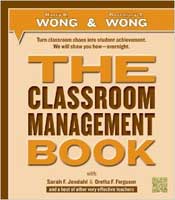 |
- Turn chaos into student achievement
- Reduce behavior issues; increase learning
- Step-by-step plans to a well-managed classroom
- 50 procedures in detail
- 40 QR codes with additional resources
- 320 pages in full color
- Complete first days of school plans
- Suitable for all grades, all subjects, all teachers
- Costs no money to implement
|
How to Be an Effective and Successful Teacheris an audio CD set that was recorded live before 800 teachers in St. Louis. Listen as they walk you through classrooms that hum with learning and share how you can replicate the same success in your classroom. In 2 hours and 40 minutes, Harry and Rosemary can transform you into a very effective and successful teacher at no cost!
This presentation has transformed the lives and teaching success of hundreds of thousands of teachers.Learn how to
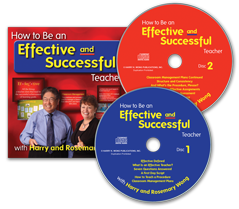 |
- Begin the school year with a plan
- Start class immediately
- Have a well-organized and structured classroom
- Reduce discipline problems
- Have students who are engaged and working
- Teach procedures and responsibility
- Maximize classroom instructional time
- Use lesson objectives so students know what they are to learn
- Use rubrics to assess for student learning
- Deal with at-risk students
- Improve student learning and achievement
|
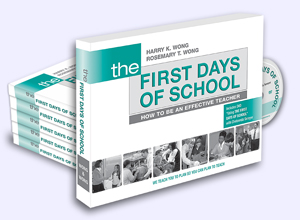 |
The Wongs have written The First Days of School, the best-selling book ever in education. Over 3.8 million copies have been sold. It is used in 120 countries, 2,114 colleges, and most every new teacher induction program. The fourth edition has been translated into five foreign languages and includes:
- An additional chapter on procedures
- A new chapter on assessment with rubrics.
- A new chapter on Professional Learning Teams
- A new chapter for administrators on implementation
- Additional information in Going Beyond Folders
- A new DVD, Using THE FIRST DAYS OF SCHOOL, presented by Chelonnda Seroyer
|
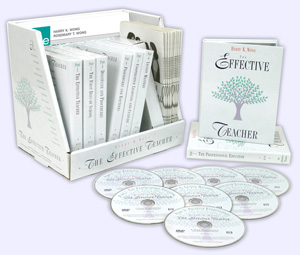 |
The Wongs have also produced the DVD series, The Effective Teacher, winner of the Telly Award for the best educational video of the past twenty years and awarded the 1st place Gold Award in the International Film and Video Festival. |
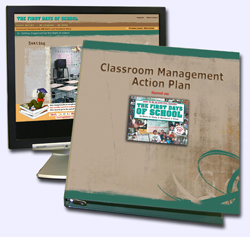 |
They also have a successful eLearning course, Classroom Management with Harry and Rosemary Wong. The course can be taken in private at the learner's convenience. The outcome of the course is a 2 inch binder with a personalized Classroom Management Action Plan.
This Action Plan is similar to the organized and structured plan used by all effective teachers. Details for the classroom management course can be seen at www.ClassroomManagement.com. |
|
You can hear Harry Wong LIVE on a set of CDs, called
How to Improve Student Achievement, recorded at one
of his many presentations. He invites you to steal from him the secrets of effective teaching for all grade levels. |
|
Never Cease to Learn has the power to transform your
attitude and your life. In this DVD, Harry shares his journey on the road to success and tells listeners how to become the educators they were meant to be. |
When the books, video series, CD, DVD, and eLearning course are used together, they form the most effective professional development training tool for producing effective teachers. Staff developers and administrators who would like to know how to implement the aforementioned book, video series, and CD are encouraged to consult the book, New Teacher Induction: How to Train, Support, and Retain New Teachers. Information about these products can be found by visiting the publisher's website at www.HarryWong.com.
Helping you produce effective teachers is our passion.
|

Harry & Rosemary Wong Columns on Teachers.Net...
If you spot a link that appears to be out-of-date, please alert us at webmaster@teachers.net!
- A Grateful Goodbye After 15 Years (Jun 2015)
- Love, Marriage, and Babies, Oh My! (May 2015)
- Retention Rate Is 100 Percent (Apr 2015)
- Teacher Effectiveness and Human Capital (Mar 2015)
- Training Teachers to Be Effective (Feb 2015)
- Making Deals Is Ineffective (Dec 2014 / Jan 2015)
- Retrieving and Carrying Electronic Devices (Nov 2014)
- Sharing to Succeed (Oct 2014)
- How a University Prepares Its Students (Sep 2014)
- Effective Teaching (Aug 2014)
- Your Future Is in Your Hands (June/July 2014)
- The Classroom Management Book (May 2014)
- When Students Succeed; Teachers Succeed (April 2014)
- Teaching New Teachers How to Succeed (March 2014)
- Execute and Praise (February 2014)
- Shaping a Solid Foundation (Dec 2013 / Jan 2014)
- The Most Misunderstood Word (November 2013)
- How to Start Class Every Day (October 2013)
- Prevention: The Key to Solving Discipline Problems (September 2013)
- Planning, Planning, Planning (August 2013)
- Are You THE One? (June / July 2013)
- Practical Examples That Work (May 2013)
- A Disability Is Not a Handicap (Apr 2013)
- Totally Inexcusable (Mar 2013)
- Be Proud of Public Education (Feb 2013)
- Structure Will Motivate Students (Dec 2012 / Jan2013)
- Orchestrating the Classroom (Nov 2012)
- The Lasting Impact of Instructional Coaching (Oct 2012)
- Learning, Laughing, and Leaving a Legacy (Sep 2012)
- Twenty-two, First Year, and Legit (Aug 2012)
- A Master Teacher of Teachers (June/July 2012)
- Where Going to School Means Success (May 2012)
- A Nationally Celebrated High School (Apr 2012)
- The Highest Rated School in New York City, Part 2 (Mar 2012)
- The Highest Rated School in New York City, Part 1 (Feb 2012)
- The Importance of Culture (Dec 2011 / Jan 2012)
- You Can Teach Classroom Management (Nov 2011)
- Seamless, Transparent, and Consistent (Oct 2011)
- Coaching Teachers to Be Effective Instructors (Sep 2011)
- How a Principal Creates a Culture of Consistency (Aug 2011)
- Graduation Begins in Your Classroom (June/July 2011)
- The Inspiration of a Mother (May 2011)
- How to Be an Effective Leader (Apr 2011)
- Learning Objectives: The Heart of Every Lesson (Mar 2011)
- Even Shakespeare Had Structure (Feb 2011)
- Effectiveness Defined: It's Not a Mystery (Dec 2010 / Jan 2011)
- Surviving Without a Principal (Nov 2010)
- Achieving Greatness: Locke Elementary School, Part 2 (Oct 2010)
- Teaching Greatness: Locke Elementary School, Part 1 (Sep 2010)
- Effective from the Start (Aug 2010)
- Ten Year Summary of Articles, 2000 to 2010 (June/July 2010)
- The Success of a Culture of Consistency (May 2010)
- Training Teachers to Be Effective (Apr 2010)
- Learning to Teach, Teaching to Learn (Mar 2010)
- Turning Teaching Dreams into Reality (Feb 2010)
- Dreams and Wishes Can Come True (Dec 2009 / Jan 2010)
- Success in a State Controlled School (Nov 2009)
- Inner City Is Not An Excuse (Oct 2009)
- Exceeding All Expectations (Sep 2009)
- Teachers Are the Difference (Aug 2009)
- Nine Year Summary of Articles, 2000 to 2009 (Jun/Jul 2009)
- Teachers Are the Greatest Assets (May 2009)
- The Tools for Success (Apr 2009)
- Assessing for Student Learning (Mar 2009)
- To Be an Effective Teacher Simply Copy and Paste (Feb 2009)
- The Sounds of Students Learning and Performing (Dec 2008)
- A School That Achieves Greatness (Nov 2008)
- Boaz City Schools: Professional Learning Teams (Oct 2008)
- It Was Something Close to a Miracle (Sep 2008)
- A Computer Teacher Shows the Way (Aug 2008)
- Eight Year Summary of Articles, 2000 to 2008 (Jun/Jul 2008)
- An Amazing Kindergarten Teacher (May 2008)
- Schools That Beat the Academic Odds (Apr 2008)
- Academic Coaching Produces More Effective Teachers (Mar 2008)
- Coaches Are More Effective than Mentors (Feb 2008)
- Wrapping the Year with Rap! (Dec 2007/Jan 2008)
- The Floating Teacher (Nov 2007)
- Taking the Bite Out of Assessment—Using Scoring Guides (Oct 2007)
- Ten Timely Tools for Success on the First Days of School (Sep 2007)
- First Day of School Script - in Spanish, Too! (Aug 2007)
- Seven Year Summary of Articles, 2000 to 2007 (Jun 2007)
- Effective Teachers End the Year Successfully (May 2007)
- Training Gen Y Teachers for Maximum Effectiveness (Apr 2007)
- Classroom Management Applies to All Teachers (Mar 2007)
- Students Want a Sense of Direction (Feb 2007)
- Rubrics in Two College Classes (Dec 2006/Jan 2007)
- How to Write a Rubric (Nov 2006)
- Assessing Student Progress with a Rubric (Oct 2006)
- A 92 Percent Homework Turn-in Rate (Sep 2006)
- Effective Teachers Are Proactive (Aug 2006)
- Five Year Summary of Articles (Jun 2006)
- Hitting the Bulls Eye as a Beginning Teacher (May 2006)
- They're Eager to Do the Assignments (Apr 2006)
- The Success of Special Ed Teachers (Mar 2006)
- What Teachers Have Accomplished (Feb 2006)
- Fifty Years Ago, The Legacy (Dec 2005/Jan 2006)
- The Emergency Teacher (Nov 2005)
- Classroom Management Is Not Discipline (Oct 2005)
- A Successful First Day Is No Secret (Sep 2005)
- The Most Important Factor (Aug 2005)
- Four Year Summary of Articles (Jul 2005)
- Improving Student Achievement Is Very Simple (Part 2) (Jun 2005)
- Improving Student Achievement Is Very Simple (Part 1) (May 2005)
- Never Cease to Learn (Apr 2005)
- His Classroom Is a Real Life Office (Mar 2005)
- The Power of Procedures (Feb 2005)
- The First Ten Days of School (Jan 2005)
- PowerPoint Procedures (Nov/Dec 2004)
- The Saints of Education (Oct 2004)
- How Procedures Saved a Teacher's Life (Sep 2004)
- How to Help Students with Their Assignments (Aug 2004)
- Three Year Summary of Articles (Jun/Jul 2004)
- His Students are All Certified (May 2004)
- What to Do When They Complain (Apr 2004)
- A Well-Oiled Learning Machine (Mar 2004)
- The Effective Teacher Adapts (Feb 2004)
- How to Start a Lesson Plan (Aug 2003)
- Applying for a Teaching Job in a Tight Market - Part 2 (Jun/Jul 2003)
- Applying for a Teaching Job in a Tight Market (May 2003)
- The Effective Substitute Teacher (Apr 2003)
- A First Day of School Script (Mar 2003)
- How to Retain New Teachers (Feb 2003)
- No Problem With Hurricane Lili (Dec 2002)
- A Class Size of 500 (Nov 2002)
- Effective Practices Apply to All Teachers (Oct 2002)
- Dispensing Materials in Fifteen Seconds (Sept 2002)
- How To Start School Successfully (Aug 2002)
- Teaching Procedures Is Teaching Expectations (June - July 2002)
- $50,000 to Replace Each Teacher (May 2002)
- Even Superintendents Do It (Apr 2002)
- Impossible, No Job Openings? (Mar 2002)
- A Stress Free Teacher (Feb 2002)
- A Most Effective School (Jan 2002)
- Van Gogh in Nine Hours (Dec 2001)
- The Effective Teacher Thinks (Nov 2001)
- How a Good University Can Help You (Sep 2001)
- How to Motivate Your Students (May 2001)
- How to Recognize Where You Want to Be (Apr 2001)
- What Successful New Teachers Are Taught (Mar 2001)
- A Journey of the Heart (Feb 2001)
- The Miracle of Teachers (Jan 2001)
- It's Not the Students. It's the Teacher. (Dec 2000)
- The First Five Minutes Are Critical (Nov 2000)
- How to Start a Class Effectively (Oct 2000)
- The Problem Is Not Discipline (Sep 2000)
- There Is Only One First Day of School (Aug 2000)
- Applying for Your First Job (Jul 2000)
- Your First Day (Jun 2000)

Related Resources & Discussions on Teachers.Net...
|
|



 One of the most successful, collegiate football coaches was Paul “Bear” Bryant from the University of Alabama. Upon his retirement, he had won 323 football games, 13 conference titles, and 6 national championships. He was immortalized in a postage stamp that showed him wearing his signature hounds tooth hat and holding a rolled up piece of paper in his hand. That was his game plan—a plan he had in his hands every single game.
One of the most successful, collegiate football coaches was Paul “Bear” Bryant from the University of Alabama. Upon his retirement, he had won 323 football games, 13 conference titles, and 6 national championships. He was immortalized in a postage stamp that showed him wearing his signature hounds tooth hat and holding a rolled up piece of paper in his hand. That was his game plan—a plan he had in his hands every single game. Sally Lutz is a tenth-grade, Intensive Reading, high school teacher in Florida. She uses a checklist format for her first day of school management plan. As she completes each item, she checks it off the list.
Sally Lutz is a tenth-grade, Intensive Reading, high school teacher in Florida. She uses a checklist format for her first day of school management plan. As she completes each item, she checks it off the list.









